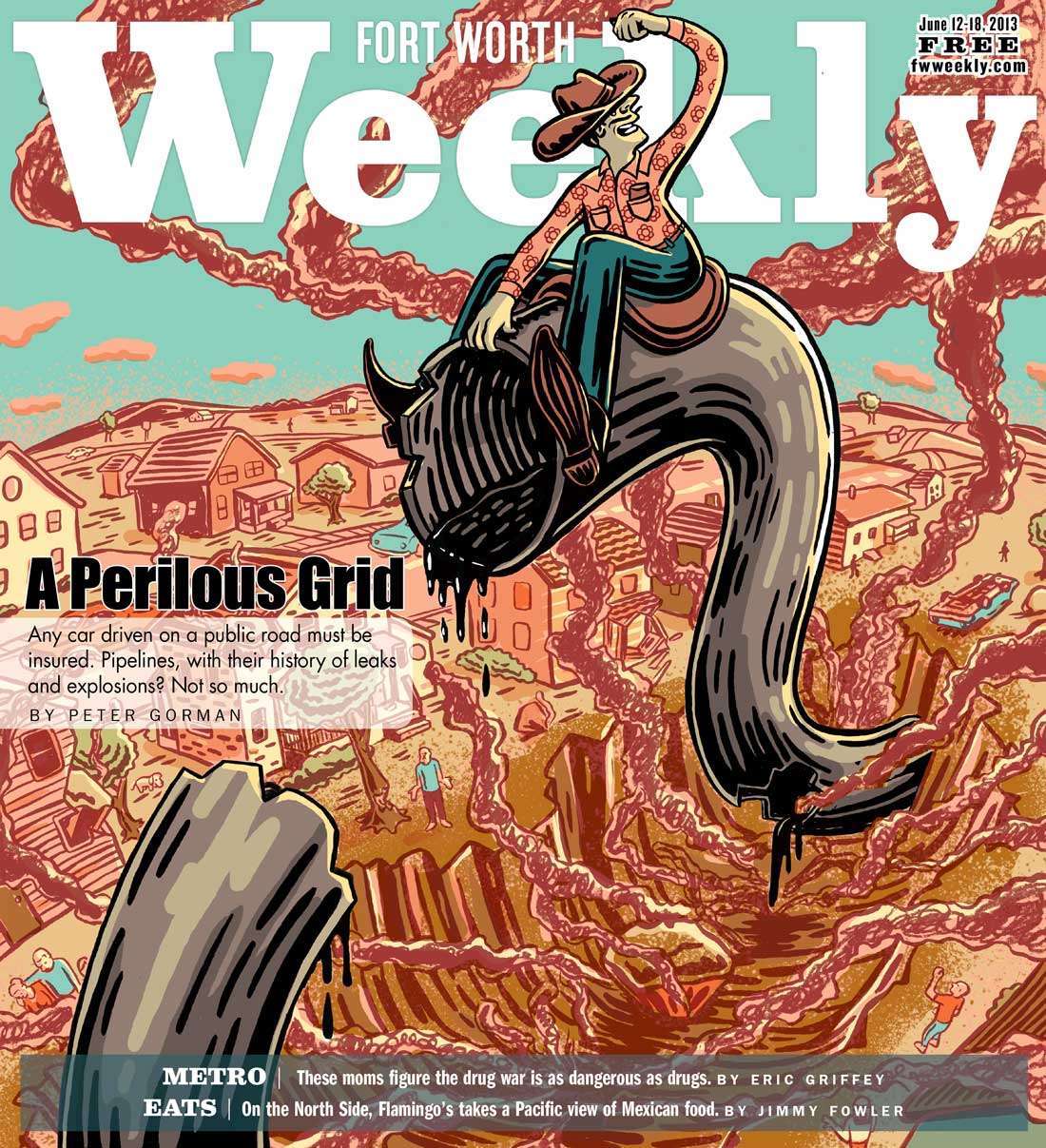They crisscross the country in a complex maze just below ground level, carrying flammable, dangerous, and highly polluting liquids and poisonous gases. They are capable of catastrophic failures that have killed people and devastated property. They corrode, they leak, they explode — and they do it with some regularity.
The millions of miles of gas and oil pipelines in the United States are vital to every aspect of modern life, but they are also perilous. And companies that own them are not required by state or federal law to carry insurance on one inch of those lines. Most Texas cities, including Fort Worth, require insurance policies, but usually in amounts that wouldn’t cover the damages from any sizable pipeline failure.
Pipeline spills and explosions are among the most destructive events associated with the oil and gas industry. The question of requiring companies to carry insurance on those lines leads quickly to concerns about other oil and gas operations that aren’t insured.
In fact, the oil and gas industry isn’t required to carry insurance on most of its installations of any kind. Oil pipeline companies pay an excise tax of 8 cents per barrel of oil produced in or imported to the U.S. to the Oil Spill Liability Trust Fund to help cover the cost of spill cleanups. But that, plus the limited insurance requirements of cities, is about it for required coverage or contributions to cleanup costs. Some companies carry insurance voluntarily; others self-insure, hoping they’ll have the money on hand to pay for any damage from leaks or explosions and to settle any lawsuits.
That might have been sufficient when oil and gas wells, and therefore most pipelines, were in rural areas. But with so much drilling now being done in cities, more and more pipelines are also being laid through neighborhoods and near heavily populated areas. That means the danger of pipelines to people has increased many times, and the potential damage from an explosion is significantly higher.
The 2010 natural gas pipeline explosion in San Bruno, Calif., killed eight people, injured 58 others, and damaged or destroyed more than 100 homes. To date it has cost Pacific Gas & Electric more than $2 billion, a figure that is expected to more than double by the time all of the lawsuits have been settled and fines paid. British Petroleum’s Deepwater Horizon explosion in the Gulf of Mexico that same year killed 11 rig hands. It has already cost $24 billion in cleanup and compensation, and the final tally is expected to be at least $10 billion more.
Both of those companies carried insurance: PG&E had a $1 billion policy, and BP was insured through its own company, Jupiter Insurance, for hundreds of millions of dollars. But neither policy paid anywhere near the costs of cleanup and liability.
Fortunately for the public and those injured, both companies have enough money to pay the remaining costs from their own assets. Not all gas and oil companies are in that position. Because pipelines tend to be sold and resold over the years to companies further and further down the food chain, the oldest and potentially the most corroded and unsafe lines may be in the hands of companies least able to pay for damages. And at the top of the food chain, huge companies like Chesapeake Energy are finding ways to put pipelines in the hands of subsidiaries that have almost no assets — and therefore almost no way to pay off any major claims.
The Oil Spill Liability Trust Fund is supposed to kick in when companies don’t have sufficient insurance or assets to pay for a cleanup or when they are slow to act or can’t cover the costs of large spills. An underfunded or uninsured company could simply walk away from a disaster and leave the mess entirely to the taxpayers to clean up.
Homeowners seldom have any say — and frequently no knowledge — about pipelines placed near their property. Understandably, they might assume that their homeowner insurance policies would pay for repairs if their property was damaged by a leak or explosion. Most of the time, that’s not the case.
In pipeline accidents, homeowners likely would have to go to court to recoup damage. Not an enviable position, considering the deep pockets and immense political influence of the oil and gas industry.
********
In Texas, where nearly 400,000 miles of pipeline run beneath farms, ranches, suburbs, and cities, the Railroad Commission oversees oil and gas wells and issues pipeline permits. The commission also sets the rules on measures companies must take to insure their financial responsibility for problems.
“If a pipeline operator’s only activity is operating a pipeline … then the operator is required to have a minimum of $25,000 in financial security posted” with the commission, said spokeswoman Ramona Nye in an e-mail to Fort Worth Weekly.
The commission’s regulations “address a pipeline operator’s responsibility for cleanup, remediation, or repair for pipeline incidents or accidents,” Nye wrote — but not liability claims from individuals. Such claims “are matters typically addressed in civil courts,” she said.
By comparison, the driver of any car or motorcycle in Texas must carry at least $25,000 in liability insurance for property damage, $30,000 in liability for each person involved in a car wreck caused by the insured, and $60,000 total for everyone involved in a car wreck.
Which means, for instance, that Access Midstream, the company that bought Chesapeake Energy’s Midstream pipeline subsidiary in 2012 and which now controls hundreds, perhaps thousands of miles of high-pressure pipe running under Fort Worth, has had to post only a single $25,000 bond to satisfy state rules and be allowed to operate in Texas. That’s in addition to whatever is required by Fort Worth or other cities.
Debbie Nauser, spokeswoman for Access, told the Weekly that the company carries insurance on its pipelines, but she didn’t know how much or with what company.
She was adamant, however, that pipeline safety is of paramount concern to Access. “Our employees live around our pipelines. We live and work where our assets are, so we’re very concerned and proactive about safety,” she said. “At the same time we realize we need to be prepared, and that includes insurance. So yes, we are insured.”
Access Midstream, which operates natural gas pipelines in 12 states, probably has enough assets to make up any shortfall in insurance coverage in the event of a major pipeline explosion. But even companies that have insurance sometimes start thinking about walking away from pipeline disasters rather than paying.
In 1999 in Bellingham, Wash., a gasoline pipeline ruptured and subsequently exploded, killing three people and sending a plume of smoke 30,000 feet into the air. The pipeline was owned and operated by Olympic Pipeline Company — the majority owner of which was Equilon, a joint venture between Shell and Texaco. Despite those huge industry names, however, a consultant who looked closely into the situation said that, afterward, there were rumors that Olympic might file for bankruptcy.
A federal investigation by the National Transportation Safety Board showed a series of missteps that included Olympic’s failure to properly train its employees, plus a faulty computer system and a faulty pressure relief valve.
Olympic, Equilon, and three Olympic employees were indicted for disregarding safety regulations and procedures and failing to make critical repairs as required by the federal Hazardous Liquid Pipeline Safety Act. The companies and individuals pleaded guilty and agreed to a $36 million settlement. One employee was sentenced to six months in prison. Another got a 30-day jail sentence, and the third was placed on probation. It was the first time a pipeline company was convicted under the 1979 law.
“After the explosion, there were hints that [Olympic] might file for bankruptcy,” said Jim Doherty, a legal consultant for the Municipal Research Services Center of Washington, a Seattle-based nonprofit that advises local governments on a variety of issues. “Fortunately,” he said, “Olympic decided not to file.”
Doherty and the research center were asked to “come up with a way to make sure that an undercapitalized company did not walk away from their obligations,” he said. They developed a model ordinance that would require improvements in pipeline construction and testing practices and also mandate that pipeline companies carry at least $100 million of liability insurance in each city or franchise area in which they operate.
Some Washington cities adopted part of the model ordinance, Doherty said, but he didn’t know of any city that had incorporated the $100 million insurance requirement.
“I think that whenever a local jurisdiction is negotiating a franchise with a company that doesn’t look like it has enough capital to cover catastrophic pipeline failure, they ought to require sufficient insurance,” he said.
Federal regulations on the insurance question “are simply not in place,” he said.
Calls to several federal agencies and commissions verified that there is no federal insurance requirement on pipelines or almost any other element of gas and oil drilling. Tamera Young Allen of the Federal Energy Regulatory Commission, which regulates the interstate transmission of natural gas and oil, said that FERC “does not have jurisdiction over holding bonds or requiring insurance on pipelines.”
The Pipeline Hazardous Materials Safety Administration “provides regulatory oversight of pipeline safety,” from design to testing, said spokesman Damon Hill, but the agency “does not have requirements for pipeline insurance.”
Rebecca Craven, program director with Pipeline Safety Trust, a watchdog organization formed in Washington state after the Bellingham catastrophe, said she could find no legal requirement for federally regulated pipelines to have any type of insurance.
“Most large oil and gas companies are going to carry insurance as a matter of course,” she said, but, “if you look at San Bruno — well, even with insurance it gives one pause. Neither the regulators nor the operator were keeping track of how well those assets were maintained.”
The recent fertilizer plant explosion and fire in West, Texas, in April showed just how deadly industrial accidents can be — and just how little insurance such companies are required to carry. Fifteen people died, and much of the town is in ruins. Costs of cleanup, rebuilding, and repairs are expected to top $100 million. The company that owned the plant carried a $1 million insurance policy; many expect the owners to file for bankruptcy and walk away.
In 1937, about 300 schoolchildren and teachers died in the New London school tragedy, the worst gas explosion in Texas history. Lawsuits brought by parents and families against the school district and the Parade Gasoline Company, whose leaking gas fueled the explosion, were all dismissed when the court found no liability.
********













Fact Check: The OIl Spill Liability Trust Fund is managed by the U.S. Coast Guard’s National Pollution Funds Center, not the EPA. See www dot uscg dot mil/npfc
Yes, it’s managed by the Coast Guard for the EPA. Please double check as appears on EPA site.
Thanks for double checking.
Peter Gorman
I’ve been out of town with limited internet access so I just got to read this.
I think this sums up what I just read:
They can forcibly take our land, install industrial processes in our backyards against our wishes, then don’t have to pay damages if they blow us up. What’s more, our insurance won’t pay because they aren’t supposed to be in our backyard.
So when the GOP talks about personal responsibility that doesn’t apply to the Fossil Fuel Mafia.
That’s a lot of “they’s”, Sharon. Let’s put faces and names on them like, Julie Wilson, or Tillerson, the entire state legislature or even, damn it, Obama. Let’s elect Bill Nye the science guy for gov. I’m tired of being pushed around by a bunch of “they’s.”
I am incensed when I hear about the dirty practices of the oil industry. It has run this country for too long. The Pegasus and Seaway pipelines run over an aquifer that eessentially provides the water to the DFW metroplex- if they were to explode, the issue isn’t whether we get paid; the issue is that we won’t have clean water to drink, bathe and wash. The risk is unacceptable for the state to allow. I say we get moving on quitting oil and start gleaning on new energy sources. Thank you for writing to inform the public.
Makes me sick to see them get away with this. Look at what an Independent Trucker has to pay for to carry a hell of allot less… The lowest public liability limit required by the FMCSA is $300,000 which is for vehicles that are under 10,000 pounds GVW. The most common is $750,000 which is for vehicles that are 10,001 GVW or more pounds. When you are carrying hazardous materials the requirements increase to $1,000,000 and if you carry liquid hazardous materials such as gasoline then the limit will be $5,000,000.
If a pipeline company condemns there’s not much you can do. Most people are not condemned & are able to put whatever requirements they want into their agreement.
I guarantee when you use a private company’s land, like a railroad, you are required to carry insurance.